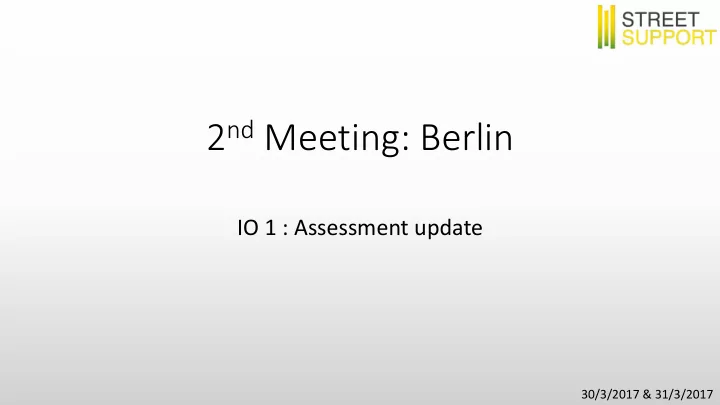

2 nd Meeting: Berlin IO 1 : Assessment update 30/3/2017 & 31/3/2017
Assessment Matrix • Desk Review : Aim 50 Articles • Analysis Desk Review : Meet Criteria/Research relevance • Expert Consultation : Aim 12 minimum. • Assessment Report : Summary & Compilation of analyzed content
Desk Review • 19 Collected & analyzed relevant articles • 10 more will be selected by RG • Majority scientific articles and policy documents
Partner Articles • Fixpunkt : 29 Articles • FEANTSA: 22 Articles • Cork Simon: 16 Articles • SPR: 7 articles
Preliminary Results • SSS (Social Support System, Netherlands) : SSS approach is effective in terms of: + Reducing disturbance of public order and criminality + Identifying and assessing the needs of group of homeless persons/problematic drug users + Providing adequate and integrated services. - Expensive -large scale approach • MAP (Managed Alcohol Program, Canada) : MAP approach is effective in terms of : 41 % fewer police contacts, 33 % fewer police contacts leading to custody time, 87 % fewer detox admissions, 32 % fewer hospital admissions. • ASBO (Anti Social Behavior Order, UK) : Majority of people impacted by ASBO : - addicted - mental health issues - financial issues →get in touch with social services but risk becoming more marginalized. It is essential that pro-arrest policing strategies become more robustly linked into drugs and alcohol intervention programs to achieve the long term inclusive goals. Investment in policing measures should come paired with substantial investment in care programs • DRR (Drug Rehabilitation Requirement, UK) : Forcing drug-using offenders to get in a rehabilitation program. + DRR likely to increase the n⁰ of homeless people accessing community drug sentences. - attention providing appropriate services for them very important or else engagement and retention in treatment is likely to remain problematic and homeless people may then find their situation worsening as breach proceedings lead to more ‘onerous’ sentences
Preliminary Results • HF (Housing First, {Spain , US, Denmark & Hungary ) : + Rise of physical community integration and personal wellbeing, + Significant reduced alcohol use among drinking ex-homeless
Expert Interviews • Ireland: 2 • Spain: 6 • NL: 4 • Belgium: 2 • Germany: • CR:
Why the expert interviews? Contributes to the assessment and supports the dissemination of the project Experts contribute to the project by sharing their specific knowledge and expertise on effective and inclusive interventions and the relation to public nuisance prerequisites for the development and implementation of effective interventions development of recommendations – guidance
Selection of experts • Experts can be local policy makers, researchers, service providers, providers for work integration, providers for adult learning, target group members , others experts, e.g. lobby and advocacy groups • Criteria for selecting: • Relevance of experience • Knowledgeability • Transferability of knowledge • Ability to transfer own experience to the macro-level
Topic List for conducting the interviews • Explanation of the project and the background of the interview (annex 2) • Contact details • Field of expertise – link to the topic of the project • Challenges for inclusive interventions on practical, policy, social and organizational level • Potential impact of inclusive interventions • Good Practice Examples and their specific impact on social inclusion and public nuisance • Transferability of specific good practice examples • Relevant trends and developments on the 4 levels • Prerequisites for the development and implementation of inclusive interventions • Recommendations
Overall guidelines • Topic list should be seen as support to guide the interview, but is open and leaves room for individual discourses • Question should be open and give the expert the opportunity to highlight specific issues • Not all questions are relevant for all experts; some additional questions might be necessary • All partners should organize between 2-5 interviews • Interviews should be taped, no transcription is needed • Interviews can be done in own language – reports need to be in English
Documentation 1 Shortlisted report for the assessment • between 300and 500 words • Solely used to provide relevant input for the assessment report an the good practice collection • Report should structure accordingly to the structure of the topiclist • all interviews need to be shortlisted
Documentation 2 Narrative interview articles • between 300 and 600 words • No question – answer article, but story-telling article, comparable to a newspaper or magazine article • More interesting for externals and offers opportunity to share via website, newsletters and social media • Describe the situation and the interviewee • Select a number of relevant issues, which were discussed and build the story alongside these issues – you don’t need to include all information • Use quotes to underline the main ideas of the interview and integrate them in the article or the heading • Partners don’t need to provide more than 2 narrative articles, if more interviews are done – select the most interesting ones
Timeline April 2017: Make final selection of experts April 2017: Conduct interviews May 2017: Send shortlisted report to RG June 2017: Send narrative interview articles June 2017: Draft Assessment Report will be send out for feedback July 2017: Final Assessment Report
Recommend
More recommend